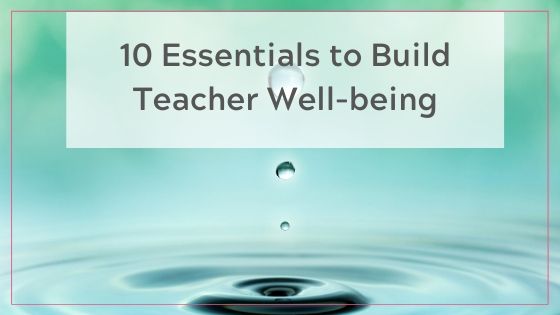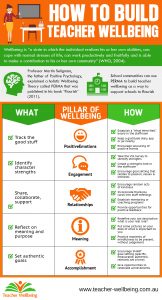Read to find 10 essentials necessary to build teacher well-being, that will support your health and help you cope in the busy world of teaching.

The components that constitute teacher well-being are very complex and are often different for everyone. However, there’s a well-known positive psychology theory by Martin Seligman, that discusses what he considers are the essential elements of a person’s well-being and happiness. It’s called The P.ER.MA. Model.
Here are elements that the model outlines:
- Positive Emotions
- Engagement
- Positive Relationships
- Meaning
- Achievement/Accomplishment
I won’t go into each one as stated here, but if you take a look at these, they involve our life achievement is as well as our personal connections, a positive emotions and mental state.
By being aware of these key areas to build teacher well-being, it helps to understand the basis of what wellness and happiness is comprised. Plus, as I mentioned before, the true complexity of this issue.
While on my journey to reset and recovery from teacher burnout, I continue to work on my own understanding of the elements of well-being, as I learn what I need to personally flourish and thrive as a teacher.
So, I’ve come up with my own essentials that I feel are important to help build teacher well-being while working in this profession.
These well-being components incorporate my new learnings, with the many years of experience as a classroom educator, as well as my training in the Mind-Body connection. The 10 ingredients that I outline, I strongly believe, are necessary to protect and build teachers’ well-being in such a demanding role that we hold.
Get your FREE Positive Affirmations printable here:
They also link closely with the elements of The P.E.R.M.A. Model and have many similarities, plus are relevant to a teachers’ life situation.
While I share these 10 with you now, I hope this information might help you to identify your own personal well-being rituals too, to keep you functioning optimally as a busy teacher.
In addition, I’m including some other supporting articles that will give you more detailed information on many of the well-being components.
Keep reading to take a look…
Just so you know – I’m not a qualified medical practitioner, so my observations are completely from a laypersons perspective. If you are experiencing any signs of mental health issues I recommend you get professional medical advice immediately.
Essentials to build teacher well-being
1. Develop a healthy work-life balance
By learning to maintain sustainable work-life habits and starting to say ‘no’ a bit more often, particularly if these things don’t serve your wellbeing, they are a crucial part to building a strong and healthy life. Setting boundaries is not about being uncooperative or difficult, it’s just giving yourself the agency over your life and offer a way of self-preservation.
Setting boundaries as an educator can be pretty tricky, and as many teachers are workaholic-people-pleasers, it can be quiet a foreign concept. But check out the following articles to help with the decisions you need to make, to get a fine balance going between home and school.
Related Articles:
- Secrets to Work-Life Balance for Teachers
- Teachers Want Work-Life Balance? Try This!
- How to Set Boundaries as a Teacher and Why It’s So Important
2. Shift your mindset
A key component to support and build teacher well-being, is understanding the huge impact that your mindset has on your life at school. This knowledge has been crucial for me to develop strategies I’ve needed, to heal and recover from burnout.
Mindset obviously begins with your thinking.
If your thoughts are negative all the time, guess what emotions are coming your way? – Probably feelings like; sadness, frustration, anger, resentfulness and other unhelpful ones. These feelings then impact the way you respond to the challenges around you.
Having a negative thought pattern will cause major problems as a teacher because it will affect whether you’ll build the resilience you need to cope with the massive changes and demands of being a teacher.
The way I’ve been intentionally changing my thoughts and inner self-talk has begun with gratefulness and positive affirmations. Every day I look for the good in my life and this then spills out into my world around me.
Why not give it a go for yourself.
Related Articles:
- 19 Positive Teacher Affirmations You Need to Start Now
- The Benefits of Fostering a Growth Mindset for Teachers
- Learn to Improve Teacher Happiness With Gratitude Journaling
Get your FREE Positive Teacher Affirmations printable from the Resource Library here:
3. Healthy eating
Eating healthy food is one of the easiest ways to build teacher well-being. Often though, as humans, we grab for the high fat and sugary foods or even consume large quantities of alcohol, as comforts when we’re busy and stressed. Obviously, this is not good for you, and it might be a habit you need to break to support your health.
Ensure that you prepare yourself three healthy meals and snacks each day, plus some clean water to sip regularly – give the coffee a miss!
This will take preparation and intention, so get yourself organised with firstly buying some fresh food from the supermarket.
Related article: Quick & Healthy Snack Ideas for Busy Teachers
4. Move more
I honestly believe exercise is a must-do component of teachers’ well-being. I’m not an expert in exercise, and it’s certainly not my favourite activity, but I know it’s an important part of staying healthy and will positively support your health and well-being.
Make sure you find some time in your day to move your body more. Things like taking the stairs instead of the lift or parking further away from the entry to the shops all help. I’ve also been experimenting with yoga, and taking a walk around the block while I’m still at school. You could also get involved with your students at lunch time!
Related Article: Healthy Teacher Tips: Easy Ways to Add Walking to Your Day
5. Connect with others
It’s healthy for anyone’s well-being to connect with supportive friends and family. However, I believe it’s EXTRA important for teachers to continue to socialize, laugh and maintain a good support network around them, even though you’re extremely busy.
And if you’re experiencing the effects of burnout or exhaustion, often keeping these connections with people can be the first thing that suffers. But don’t let it!
It’s so important to continue to maintain your friendships and seek them out, as a way to build teacher well-being.
6. Collaborate
You might think that collaboration is an odd thing to include here when talking about teacher well-being. However, if you’ve taught for a long time, like I have, you’ll know how important it is to develop relationships with helpful teachers to work alongside you.
By understanding that teaching is a team sport, and that you’ll need to find like-minded colleagues in your career, this will help with the many factors involved in your teaching role. Even if it’s just catching up to de-brief after a difficult day, other understanding educators can be such wonderful support for you.
You can achieve so much more if you have these positive working relationships. Include teaching partners, the teacher next door, or other educators in your year-level cohort. Seek them out. You won’t regret it!
7. Learn to relax
Incorporating relaxation practices into your day, is a necessary component to build a healthy well-being. While relaxation is a personal thing for everyone, just remember to do some things that you love to help wind down. Also include some mindfulness activities to let your brain rest too.
Relaxation activities could be things like hobbies, baths, music and calm mornings – all of these can help you to revert to the relaxation state and combat the effects of stress build up.
Related Articles:
- 15 Easy Techniques to Relax and Beat Stress!
- 6 Easy Ways to Bring Mindfulness into the Classroom
- Mindfulness for Teachers: 9 Easy Activities to Stay Calm in a Stressful Job
8. Manage your stress
Make sure you use a variety of strategies to help shift your body from the stress response to a healthier, more balanced state. This will allow the fight or flight system to rest when it’s been on high alert all day.
Suggestions for stress-relievers are tummy breathing, exercise, getting out in nature, sleep, and limiting your technology exposure. Remember not to overschedule yourself with home & work too.
Check out these posts to give you a variety of ways to help with your stress management.
Related Articles:
- An Easy Way to Relieve Teacher Stress (You Won’t Believe How Simple It Is)
- 15 Easy Techniques to Relax and Beat Stress!
- Why is it so Important for Teachers to De-Stress?
Don’t forget to get your FREE Affirmations printable from the Resource Library here:
9. Organize and prioritize
Organizing your life in and out of the classroom can take effort, but I strongly believe it contributes to teacher well-being. You know…when you feel organized and on top of things, it helps cut the overwhelm and becomes a necessary part of coping in a busy and demanding profession.
If you’re not such an organized person, start out small and focus on one area of your life at a time.
My tip is to use a planner and a to-do list at school and at home, where you can keep all of your appointments and tasks in one place. Make sure to prioritize these jobs for their importance and only do the most important things first! Read here for an easy 3-Step To-Do List System to explain this in more detail.
Other Related Articles:
- 7 Super Easy Ways to Simplify Your Teaching Life
- The Secret to Easy Meal Planning for Busy Teachers
- 9 Quick and Easy Dinner Ideas for Busy Teachers
10. Have fun
If you’re a classroom teacher, there really is no excuse not to have a bit of fun in your day. You can laugh at the funny things that happen, as they do, working with kids or use games in your students’ learning and enjoy the time with them while they engage in this.
At home, top-up on the fun with some belly laughs by watching comedy movies or your favourite TV shows. This will supply you with the feel-good endorphins you need to support your well-being.
Did you know? Laughter is known to decrease stress hormones, increase immune cells and infection-fighting antibodies, making you more disease-resistant Helpguide.org.
Laughter really is the best medicine!
In closing – A final word about essentials to build teacher well-being
TeacherWellbeing.com.au has an interesting infographic about how to build teacher wellbeing that I thought is worth sharing here too (It matches the P.E.R.M.A theory of well-being):

I hope my suggested 10 essentials to build teacher well-being have been helpful for you to understand, support and identify ways for you to feed your own well-being and happiness as a busy educator.
Keep strong my friend. You’re doing an awesome job!
Michelle x
P.S. Don’t forget to get your FREE Positive Affirmations for Teachers here at the Teachers Resource Library:
Other Related Articles
- Teachers: Enjoy the 7 Benefits of a Self-Care Bath
- How to Improve Teacher Mental Health: A Personal Story
- How You Can Improve Teacher Happiness in Difficult Times
Pin for Later!



Leave a Reply